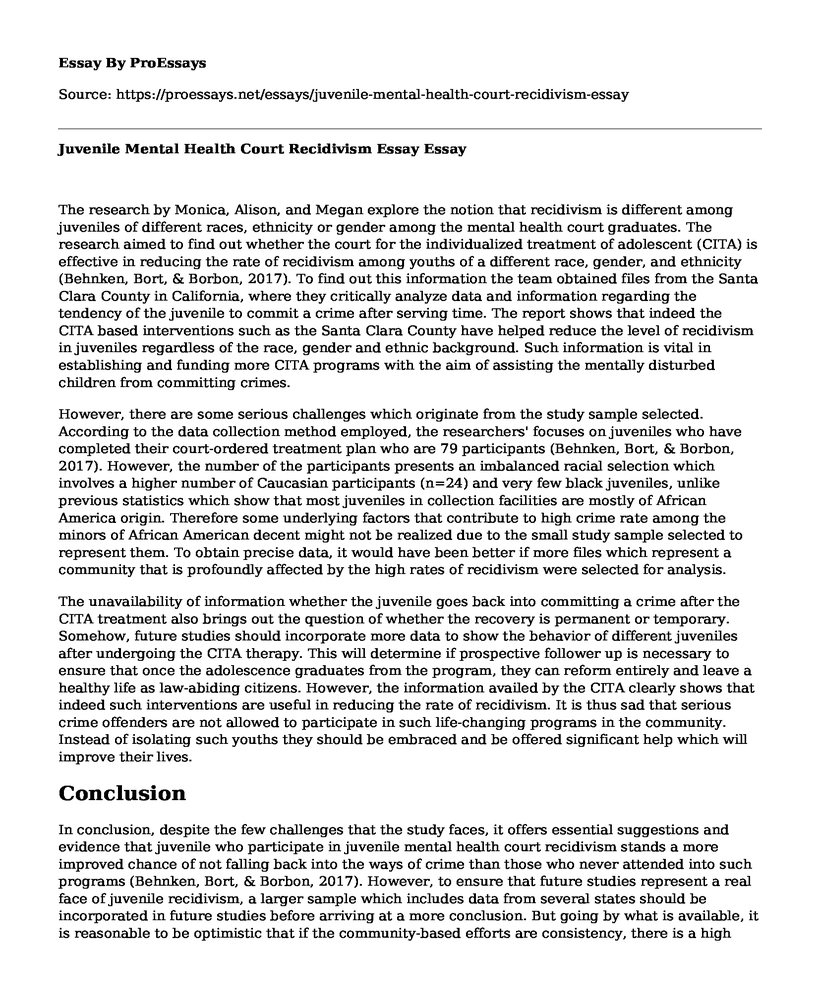The research by Monica, Alison, and Megan explore the notion that recidivism is different among juveniles of different races, ethnicity or gender among the mental health court graduates. The research aimed to find out whether the court for the individualized treatment of adolescent (CITA) is effective in reducing the rate of recidivism among youths of a different race, gender, and ethnicity (Behnken, Bort, & Borbon, 2017). To find out this information the team obtained files from the Santa Clara County in California, where they critically analyze data and information regarding the tendency of the juvenile to commit a crime after serving time. The report shows that indeed the CITA based interventions such as the Santa Clara County have helped reduce the level of recidivism in juveniles regardless of the race, gender and ethnic background. Such information is vital in establishing and funding more CITA programs with the aim of assisting the mentally disturbed children from committing crimes.
However, there are some serious challenges which originate from the study sample selected. According to the data collection method employed, the researchers' focuses on juveniles who have completed their court-ordered treatment plan who are 79 participants (Behnken, Bort, & Borbon, 2017). However, the number of the participants presents an imbalanced racial selection which involves a higher number of Caucasian participants (n=24) and very few black juveniles, unlike previous statistics which show that most juveniles in collection facilities are mostly of African America origin. Therefore some underlying factors that contribute to high crime rate among the minors of African American decent might not be realized due to the small study sample selected to represent them. To obtain precise data, it would have been better if more files which represent a community that is profoundly affected by the high rates of recidivism were selected for analysis.
The unavailability of information whether the juvenile goes back into committing a crime after the CITA treatment also brings out the question of whether the recovery is permanent or temporary. Somehow, future studies should incorporate more data to show the behavior of different juveniles after undergoing the CITA therapy. This will determine if prospective follower up is necessary to ensure that once the adolescence graduates from the program, they can reform entirely and leave a healthy life as law-abiding citizens. However, the information availed by the CITA clearly shows that indeed such interventions are useful in reducing the rate of recidivism. It is thus sad that serious crime offenders are not allowed to participate in such life-changing programs in the community. Instead of isolating such youths they should be embraced and be offered significant help which will improve their lives.
Conclusion
In conclusion, despite the few challenges that the study faces, it offers essential suggestions and evidence that juvenile who participate in juvenile mental health court recidivism stands a more improved chance of not falling back into the ways of crime than those who never attended into such programs (Behnken, Bort, & Borbon, 2017). However, to ensure that future studies represent a real face of juvenile recidivism, a larger sample which includes data from several states should be incorporated in future studies before arriving at a more conclusion. But going by what is available, it is reasonable to be optimistic that if the community-based efforts are consistency, there is a high chance of reducing recidivism among the mentally disordered juvenile offenders.
References
Behnken, M. P., Bort, A., & Borbon, M. (2017). Race and Gender Recidivism Differences Among Juvenile Mental Health Court Graduates. Juvenile and Family Court Journal, 68(2), 19-31. doi:10.1111/jfcj.12092
Cite this page
Juvenile Mental Health Court Recidivism Essay. (2022, Jun 27). Retrieved from https://proessays.net/essays/juvenile-mental-health-court-recidivism-essay
If you are the original author of this essay and no longer wish to have it published on the ProEssays website, please click below to request its removal:
- Paper Example on Assessment and Treatment of Disordered Anxiety
- The Unlicensed Reproduction of Copyrighted Media Essay
- Essay Sample on The Importance of "Letter from Birmingham Jail" Document
- Randy's Case: Schizophrenia Case Study Analysis
- Research Paper on Death Penalty: Punishment or Revenge?
- The Digital Youth: Social Media & Adolescence in the 21st Century - Essay Sample
- Exploring Antidepressant Medications: Mechanisms, Challenges, and Alternative Therapies for Depression







